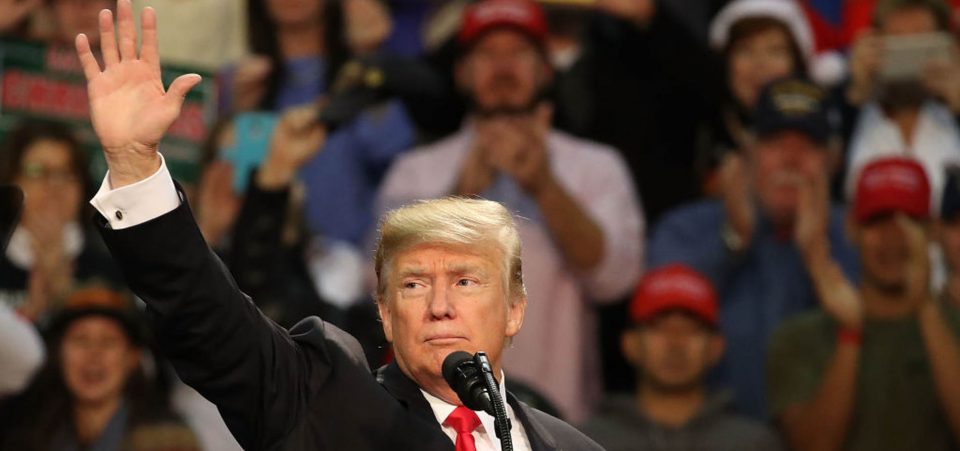Donald Trump’s Mixed History of Support for Net Neutrality
Donald Trump is mostly staying out of this one. He let his Federal Communications Committee (FCC) nominee, Ajit Pai, do most of the grunt work. The known net neutrality foe pulled out all the stops to arrest gains seen under the Obama regime, signaling tacit support for the controversial doctrine.
On Thursday, the FCC made it official and repealed net neutrality guidelines instituted under former President Obama. The Commission voted 3-2 (falling along party lines) to rescind the rules, arguing that the FCC overstepped when it originally enacted the net neutrality protections. “This is the way things were prior to 2015, and this is the way they will be once again.” (Source: Carter, B., Trump Jr. goes after ‘outrage’ following net neutrality repeal, The Hill, December 14, 2017.)
Whether Donald Trump has a particularly strong opinion on the subject is unclear. Being the by-product of an age where the Internet wasn’t available most of his life, we know Trump isn’t a big Internet user.
For example, according to court documents obtained last decade, Trump didn’t use a computer at his home or in his office, didn’t send text messages, and e-mailed infrequently. Trump’s words according to a 2007 deposition were “I don’t do the email thing.” Six years later, he essentially said the same thing “Very rarely, but I use it,” when discussing whether he had embraced e-mail in 2013. (Source: Tani, M., Donald Trump isn’t a big fan of emails and didn’t own a home computer until at least 2007, Business Insider UK, July 29, 2017.)
There’s no doubt that Trump has embraced Twitter in recent years. It’s a start. But perhaps Trump’s seemingly better familiarity with “old media” is keeping strong opinions at bay.
In fact, we have to go as far back as November 2014 to get a definitive stance regarding Donald Trump on net neutrality. In typical Trumpian fashion, he took to Twitter to deride Barack Obama for pushing for net neutrality when he became POTUS. His position leaned conservative on the matter, joining the chorus of people on the right who believed “fairness” was just a euphemism for control.
Obama’s attack on the internet is another top down power grab. Net neutrality is the Fairness Doctrine. Will target conservative media.
— Donald J. Trump (@realDonaldTrump) November 12, 2014
Trump net neutrality tweet aside, it looks like Trump is taking a passive approach on the matter. His nomination of Ajit Pai certainly means he wasn’t against it. But it seems obvious that Trump has elected to steer clear of the sensitive debate that threatens to alienate supporters on both sides. Particularly his conservative-right base, which already feels the media exerts too much control in their sandbox.
In other words, Trump’s letting his surrogates do the talking.
Donald Trump Jr. Weighs in
Most recently, Donald Trump Jr. has gone after net neutrality opponents with a stinging rebuke of their opposition on the matter.
Proving the apple doesn’t fall far from the tree, Trump Jr. took to Twitter to make his voice heard, tweeting: ““I would pay good money to see all those people complaining about Obama’s FCC chairman voting to repeal #NetNeutality actually explain it in detail. I’d also bet most hadn’t heard of it before this week. #outrage”
I would pay good money to see all those people complaining about Obama’s FCC chairman voting to repeal #NetNeutality actually explain it in detail. I’d also bet most hadn’t heard of it before this week. #outrage
— Donald Trump Jr. (@DonaldJTrumpJr) December 15, 2017
As expected, the rebuke aroused a strong reaction from liberal America. Not just to the issue itself, but also to the fact that Trump “won.” But do the critics have a point?
What Is Net Neutrality?
In a nutshell, net neutrality is a policy that doesn’t allow Internet service providers (ISPs) to discriminate between Internet traffic among different web sites. Not only does it prevent web servers from blocking a web site for ideological reasons, but it also protects bandwidth availability for all traffic. Less bandwidth means slower load speeds. If big corporations have the ability to throttle bandwidth, they can essentially choose winners on the Internet.
For example, imagine one of the big telecoms such as AT&T Inc. (NYSE:T) deciding to purposely throttle bandwidth for Netflix, Inc. (NASDAQ:NFLX) users or demanding that they pay more to make their connection usable. All the while, AT&T subsidiaries are allowed to stream their content unabated. That would create an unfair competitive advantage according to critics, a claim that is hard to argue against.
Remember, AT&T is currently in talks to buy Time Warner Inc. (NYSE:TWX). If and when this merger closes, AT&T would have access to “HBO GO,” making the above scenario entirely plausible.
What does the public think about all of this? According to a recent poll by Mozilla and Ipsos, 76% of Americans broadly support it, including 81% of Democrats and 71% of Republicans. The elevated and bi-partisan strength of these numbers indicate that ironclad support for net neutrality runs deep in the United States.
Verdict
Trump has played his cards right by letting his surrogates handle this political hot potato. There’s just not much out there in the public domain from Trump on this issue. Trump obviously supports the measure, as evidenced by his nomination of FCC Chair Ajit Pai and Trump Jr.’s post-mortem comments.
Now that some are predicting the apocalypse after the repeal, it remains to be seen whether the left’s worst fears will be realized.






